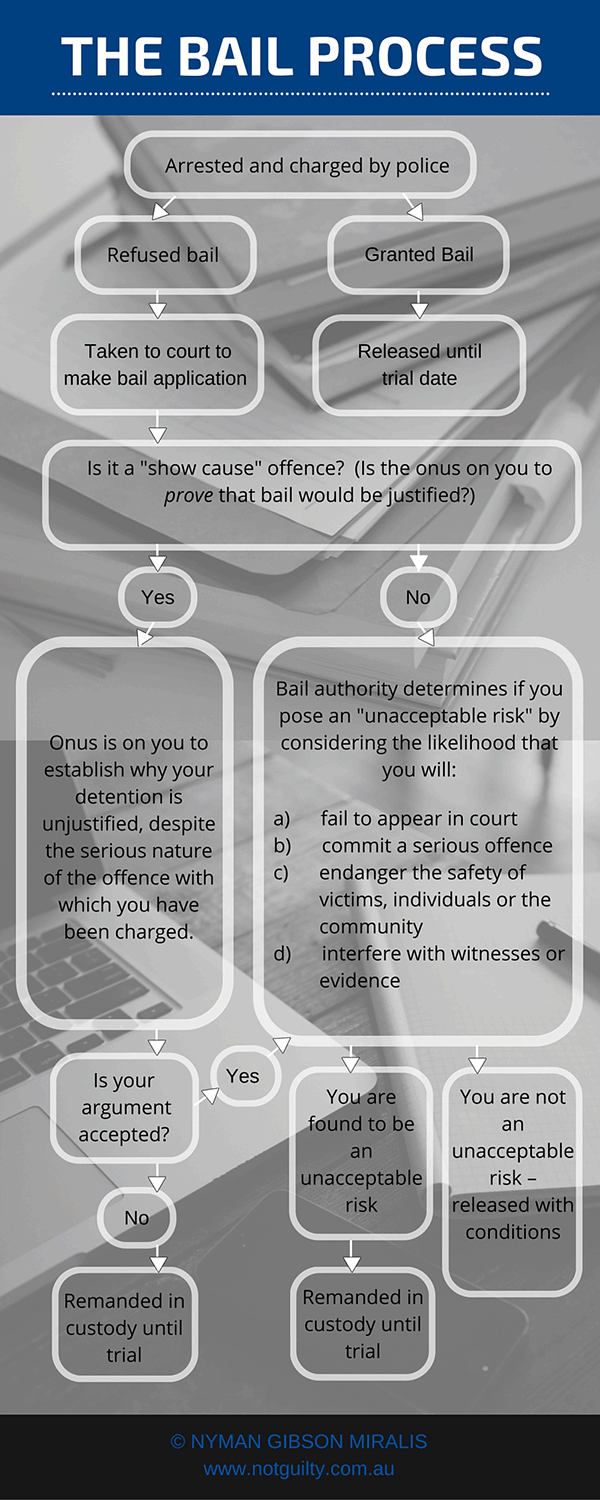What is Bail?
If you have been arrested and charged with a crime, you may be granted bail. A certain amount of money – determined by the police initially – may need to be paid by a third party, such as a friend or relative, to ensure that you comply with the conditions of bail. If you fail to comply with the bail conditions, such as attending your court date, not only will there be a further warrant for your arrest, but the money will be forfeited.
What Should I Do if I Am Arrested?
The first thing you should do as soon as you have been arrested, no matter what the circumstances or the time, is to contact a criminal defence expert. Arrests can and often do happen at any time of day or night and on the weekends – and you are not required to wait until business hours to contact your lawyer. Your family, a friend or even a colleague can also make the initial call for assistance.
You will then be given advice on your prospects of success in a bail application, and the best method of applying. You or your family will also be given advice on the sorts of conditions that may be imposed on you if bail is granted, how much may need to be paid by way of surety, and other requirements you will need to meet to satisfy the court that you are suitable for bail.
How Do I Get Bail?
When you have been charged by the police, you should request bail at that point. Depending on various factors, including whether you have been charged with a very serious crime, you may be granted this “police bail” immediately. If this is the case, it means that you can be released into the community and largely go about your normal life until your trial date. Depending on the severity of the offence, you may need to comply with certain conditions to meet the terms of your bail, such as being required to reside at a specific address and to report to the nearest police station.
If the police refuse bail at the station, then you will be taken to appear before the nearest court and can make a further bail application at that time. You should ensure that you have obtained legal advice before you make a bail application, so that your bail application is expertly prepared and presented to the court.
The Bail Process

Am I Likely to Make Bail?
The changes to the bail laws have made it increasingly difficult to obtain bail in certain circumstances, depending on the nature of the offence with which you have been charged. The changes were implemented in response to community concerns about the NSW Government being soft on crime after bail was granted in several murder cases.
Bail may be more difficult to obtain for serious drug offences such as importations, violent offences including sexual offences, murder and robbery.
You may also find it more difficult to be granted bail if you already have certain offences on your criminal record, are considered a “repeat offender”, or were already on a bond or on bail at the time of the alleged offence.
Other factors which may limit your chances of getting bail include a lack of community or family ties and any failure to comply with previous bail conditions. It is important for you or a family member to advise your solicitors of any relevant factors such as these as soon as possible.
For more information on the bail law changes and how they work in practice, see our article on the new bail laws.
What Happens if My Bail Application is Unsuccessful?
Since the changes to NSW legislation, you can only lodge a second bail application in the Supreme Court – which can be a lengthy exercise. It is therefore important that you give yourself the best chance of making a successful bail application the first time around by engaging lawyers as soon as possible.
But do not despair if you have already had a failed bail application. Nyman Gibson Miralis specialises in previously unsuccessful applications and matters where inexperienced people, such as those representing themselves or non-criminal lawyers, have failed to obtain bail.
How can Nyman Gibson Miralis assist you?
Our Sydney criminal lawyers are bail application experts. Contact us for 24/7 legal advice.

